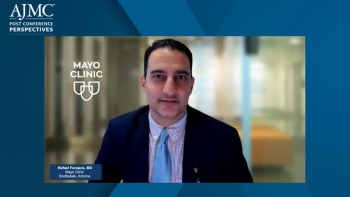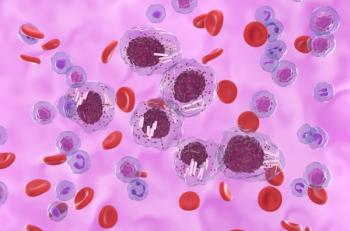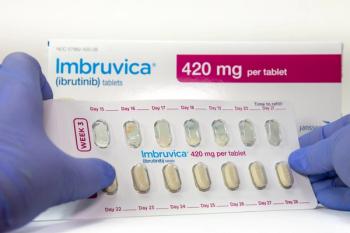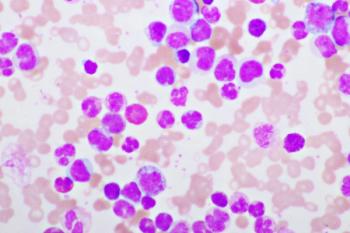
Chronic Lymphocytic Leukemia/Small Lymphocytic Lymphoma
Latest News

Latest Videos
CME Content
More News

Sikander Ailawadhi, MD, discusses how the 2024 ASH Annual Meeting’'s study on “"Hematologists’' Approach to Discussing Older Patients’ Values in the Context of Allogeneic Hematopoietic Cell Transplantation”" explored the methodologies hematologists use to engage older patients in treatment decisions, highlighting key findings related to patient values and the importance of incorporating these factors into transplant decision-making for improved patient-centered care.

One study found most—but not all—patients with chronic lymphocytic leukemia disease progression while taking a Bruton tyrosine kinase inhibitor (BTKi) had a key mutation linked to resistance.

Sikander Ailawadhi, MD, discusses how the 2024 ASH Annual Meeting’s “Survivorship Burden and Patient Preferences Affecting Treatment Choices Among Multiple Myeloma Patients” study examined real-world factors influencing treatment decisions, highlighting the significant role of survivorship burden and patient preferences, and emphasizing how these findings should shape the management strategies for patients with multiple myeloma.

The long-term safety of ibrutinib was proven in patients with newly diagnosed or relapsed or refractory (R/R) chronic lymphocytic leukemia (CLL) and small lymphocytic lymphoma (SLL).

Quality-of-life (QOL) outcomes vary widely for patients receiving first-line treatment for chronic lymphocytic leukemia (CLL), according to research presented at the 2024 American Society of Hematology (ASH) meeting.

A third-generation chimeric antigen receptor (CAR) T-cell therapy yielded encouraging response rates and safety findings among patients with relapsed or refractory chronic lymphocytic leukemia (CLL).

Sikander Ailawadhi, MD, discusses how the 2024 ASH Annual Meeting’s “Prospective Patient Preference Study for BTKi Treatment Attributes in CLL and SLL” explored the factors influencing patient decision-making, revealing key treatment preferences and highlighting the importance of incorporating these insights into clinical practice when selecting BTK inhibitors for patients with CLL or SLL.

This interview will appear in the January 2025 issue of Evidence-Based Oncology, our annual recap of the American Society of Hematology Meeting and Exposition. After this article went to press, the company announced its ticker symbol on the Nasdaq will change January 2, 2025.

This year’s most-read articles on chronic lymphocytic leukemia (CLL) and small lymphocytic lymphoma (SLL) explored treatment adherence patterns, patient symptom assessment, research on treatment efficacy, and more.

Sikander Ailawadhi, MD, discusses how emerging trends in targeted therapies, immunotherapies, and precision medicine presented at ASH 2024 are addressing unmet needs in the management of hematologic cancers and shaping future treatment strategies.

Secondary immunodeficiency disease (SID) status was associated with significantly higher risk for severe bacterial infections in adult patients with chronic lymphocytic leukemia (CLL)/small lymphocytic lymphoma (SLL).

Three abstracts presented at the 2024 American Society of Hematology annual meeting focused on patient preferences and treatment choices in blood cancers.

The study offers insights on how to counteract resistance to Bruton tyrosine kinase (BTK) inhibitors.

Long-term data support the safety and efficacy of venetoclax (Venclexta) and obinutuzumab (Gazyva) in chronic lymphocytic leukemia (CLL), though questions remain about which patients would benefit most from the regimen.

Meaningful change thresholds for the EORTC Quality of Life Questionnaire in chronic lymphocytic leukemia (CLL) or small lymphocytic lymphoma (SLL) are: −11/+11 for symptom burden, −16/+16 for physical condition/fatigue, and −16/+13 for worries/fears.

Despite found associations, due to small sample sizes the researchers suggest readers interpret their findings with caution.

This multiyear follow-up of more than 3300 patients with relapsed/refractory chronic lymphocytic leukemia (R/R CLL) who received ibrutinib—the longest study of its kind—confirms the agent’s efficacy as a salvage treatment but reveals new information about its impact in different subpopulations with varying clinical characteristics.

The new report is an attempt to provide comprehensive safety data on the rapidly changing treatment landscape for relapsed or refractory chronic lymphocytic leukemia (CLL).

For patients with chronic lymphocytic leukemia (CLL) treated previously with venetoclax and Bruton’s tyrosine kinase inhibitors, many more trials are needed to pinpoint the best next steps

The venetoclax-based regimen was associated with an approximate $8000 decrease in costs compared with the continuous Bruton tyrosine kinase inhibitor treatment 6 months after the fixed-duration period.

These findings suggest that KIR2DS2-positive (KIR2DS2+) natural killer (NK) cells could be an attractive therapeutic target for in vivo strategies, although enhanced effector function is lost during ex vivo expansion needed for NK cell–based therapies, such as chimeric antigen receptor–NK cell treatment.

Although Bruton tyrosine kinase (BTK) inhibitor monotherapy in chronic lymphocytic leukemia (CLL) has been a game-changer, patients have significantly increased risks of infection, especially in the upper respiratory tract.

The long-term response rate for zanubrutinib was better than ibrutinib in patients with relapsed/refractory chronic lymphocytic leukemia (CLL) and small lymphocytic lymphoma (SLL).

A new study identifies potential immune profile differences in patients with chronic lymphocytic leukemia (CLL) that may lead to resistance after ibrutinib therapy.

The study found that the price tag for the second-generation Bruton tyrosine kinase inhibitor would need to be reduced by 30% in order to be cost-effective compared with bendamustine-rituximab (R-bendamustine) for these patients.












